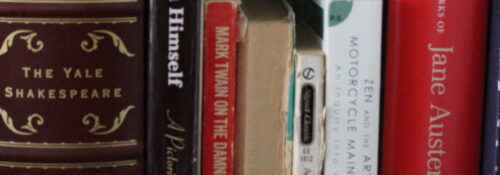
Hillsdale Chemistry Professors’ Book Recommendations: Part 1
Written by Brynn Elson
“And where goodness and truth exist, there you will find beauty.” So reads Hillsdale College’s description of the good, the true, and the beautiful. These three words seem stereotypical or overused on occasion, but they are used often to describe Hillsdale’s mission because they are the most accurate description of our mission and curriculum. Each branch of Hillsdale’s curriculum offers a unique perspective and a different way to contemplate beauty. All of these separate branches, however, emanate from the same trunk of scholarship. To be scholars and teachers of the liberal arts, our faculty have to be liberally well-read and passionate about their field of study. Hillsdale’s chemistry faculty are no exception to this rule; they are avid readers, just like the rest of Hillsdale’s professors. Some of their favorite books might even surprise you.
Dr. Lee Baron
Organic Chemistry
Dr. Baron loves literature that is “conversational”—that draws readers in with personal elements and anecdotes. She especially enjoys books with double meanings, like the Fairy Tales of Hans Christian Anderson, which she describes as “not as grim as Grimm’s.” These short, well-written, and imaginative books teach young people that choices have consequences. However, they are still a valuable read from an adult’s perspective. Dr. Baron also enjoyed The Annotated Alice, a commentary on Lewis Carroll’s fairy tale that discusses political and social elements hidden in the story. On the topic of fairy tales in general, Dr. Baron said that it’s important to know both extremes—Grimm and Disney—so you can put them in conversation and understand the central message of the story.
Dr. Baron loves other children’s books, such as Le Petit Prince, A Wrinkle in Time, and Winnie the Pooh. In fact, she had a Winnie the Pooh-themed card sitting on her desk when I interviewed her. She said, “It’s the puzzle that makes me excited to read them…Pooh isn’t really about Pooh, you know.” Le Petit Prince and A Wrinkle in Time are about all the sci-fi she reads—she says, “I don’t like sci-fi books that you need a dictionary or glossary to understand.”
Dr. Baron also loves Pride and Prejudice, for both the satire and the creative description of the time period. Another of her favorite classics is Dante’s Inferno, which she claims she could read over and over again.
Although she (like most Hillsdalians) loves C.S. Lewis, Dr. Baron is especially fond of The Screwtape Letters for its tongue-in-cheek style. She describes this book as conversational because it presents an alternative view of the workings of good and evil inside ourselves. She describes the book as “a creative way to address the insidiousness of evil in the world around us, and which resources we have to fight it.” The book encourages us to put on “battle armor” to fight evil in all the guileful forms in which it may appear.
Dr. Mardi Billman
Inorganic/Computational Chemistry
Although she is an inorganic and computational chemist, Dr. Billman took an upper-division elective English class in which the professor curated his top 100 books over the course of a year. One of the books was Crime and Punishment by Fyodor Dostoyevsky. Dr. Billman’s professor warned the class that the book might make them feel physically ill because it puts them in the mindset of a horrible person: the narrator of the story is a criminal who spends nearly the whole book trying to justify himself and avoid the consequences of his crime. Dr. Billman loves the book because the ending (which I won’t spoil here) is a different way of “justice served”—with the realization of his own awfulness, the main character gets both punishment and redemption.
Dr. Billman also loves Dante’s Inferno (and no, she’s not just saying that because it’s part of the core curriculum or because Dr. Baron said it, too). This book, which she claims legitimately got her into reading classic literature, is fun to read because “you want the characters to get their comeuppance.” Like Crime and Punishment, it deals heavily with the concepts of justice, redemption, and damnation.
On a lighter note, Dr. Billman enjoys The Hobbit, especially as a follow-up to the Lord of the Rings (LOTR) trilogy. She expected something as dense as the LOTR trilogy, but instead found that The Hobbit was “just a fun romp” that also helped to explain the motivations of some characters.
Dr. Kelli Kazmier
Biochemistry/Physical Chemistry
Dr. Kazmier, like Dr. Billman, loves Russian literature. Dr. Kazmier’s all-time favorite book, which she read over the course of a long summer research internship, is Leo Tolstoy’s Anna Karenina. According to Dr. Kazmier, this book is unlike much of our literature today because it is character-driven rather than plot-driven: “All of the characters do exactly what they would do in the most believable way,” she said. Tolstoy’s masterful way of capturing human behavior is also compelling. Dr. Kazmier sees authors of this caliber as “people who understand the human condition in a way that psychology can’t explain.”
Dr. Kazmier also loves The Sun Also Rises by Ernest Hemingway, which she describes as “a very small story that lingers.” This story, an examination of the path not taken, follows the classic Hemingway paradigm of the examination of a life and the discovery of beauty in humble things. However, Dr. Kazmier dislikes much of modern literature that attempts to imitate this paradigm. In her words, “I can’t read modern literature because it’s too Hemingway-esque!”
After reading too much Hemingway and Russian literature, Dr. Kazmier found herself down in the dumps…and if you read these books, you might understand why. To cheer her up, a friend suggested she read A Confederacy of Dunces by John Kennedy Toole. Dr. Kazmier describes this hilarious book as the story of a “man-child from New Orleans who has the hottest takes.” The subject of the book, who is a hilariously naive, goofy misanthrope, has a “cornucopia of terrible personality characteristics” that cause readers to simultaneously hate and love him.
Dr. Courtney Meyet
Organic Chemistry
Although many of her students know her as a master of organic synthesis and an avid Ironman competitor, Dr. Meyet is also a huge John Steinbeck fan. One of her favorites is the Pulitzer Prize-winning Grapes of Wrath, which narrates the lives of a migrant family suffering through the Great Depression. However, she also loves Cannery Row, which is much more jolly and lighthearted than Steinbeck’s other literature. Although this book is also set during the Great Depression, Dr. Meyet claims it doesn’t have the “deep-seated angst” that characterizes most of Steinbeck’s work—it’s apparently just a lighthearted story “about a bunch of fun hobos.”
Dr. Meyet also enjoys books by Kate Morton, who writes historical fiction and mystery novels. Dr. Meyet describes the first of Morton’s books as “a lucky airport find” that inspired her to read the rest of them. Morton has written bestsellers such as The Clockmaker’s Daughter and The Forgotten Garden.
As a nonsectarian Christian institution dedicated to the pursuit of truth, beauty, and goodness, Hillsdale includes chemistry in its curriculum as a unique and wonderful way of contemplating beauty. The beauty of creation as revealed through chemistry is especially awe-inspiring when one considers that creation was made by God, and God gave man dominion over it. Chemistry reveals God’s hand in creation in subtle ways that other branches of the liberal arts cannot. To divorce science from literature is impossible, as evidenced by the wealth of literary information that Hillsdale’s chemistry faculty have to share with their students. Look for additional book recommendations from Hillsdale’s professors in Part 2 of this series.
Read more about chemistry at Hillsdale here.
 Brynn Elson, ’23, is a biochemistry major with a decent comprehension of the English language. She enjoys drinking coffee, playing the clarinet, and overcommitting to things. When she’s not studying (which is rare), you might be able to find her running (read: getting lost) on the back roads or complaining about Hillsdale’s lack of mountains.
Brynn Elson, ’23, is a biochemistry major with a decent comprehension of the English language. She enjoys drinking coffee, playing the clarinet, and overcommitting to things. When she’s not studying (which is rare), you might be able to find her running (read: getting lost) on the back roads or complaining about Hillsdale’s lack of mountains.
Published in December 2022